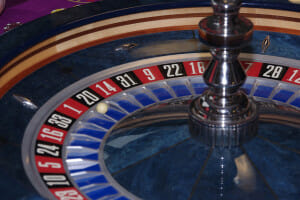Gambler’s Fallacy – A Definition and Example of this Losing Betting Philosophy

By Steve Beauregard
It’s a stupid and idiotic system.
And I fall for it all of the time.
It’s called the “Gambler’s Fallacy,” which is the belief that you can predict an independent, random event, based on the results that have occurred previously.
It’s used in roulette all the time by stupid people. But enough about me. Here’s an example.
You see the lighted board next to the roulette wheel. It shows that the ball has landed on, say, black, 6 times in a row. You know that there is roughly a 50/50 chance that it will land on red, but there’s this streak of 6 blacks in a row. Red is due, right?
Wrong.
Assuming the roulette wheel is working properly, (and it always is), Each spin of the ball is a completely independent event. The ball doesn’t remember that it landed on black last time. It doesn’t know it is supposed to land on red. Even if you try to remind it, (which I have after a few cocktails).
We bet on Red because we think, “What are the odds of it landing on black seven times in a row?” when we should be thinking, “What are the odds of it landing on red on THIS spin?”
The Gambler’s Fallacy is our natural belief that things always equal out. We believe it because they actually do.
The color red will in fact, show up exactly as often as the color black. But that’s in the long run. And our problem as gamblers sometimes is not realizing that the long run is longer than you can imagine.
The long run is longer than our three day stay in Las Vegas and it’s bigger than both our bankroll and the casino’s table limits.
Red and black will appear with near equal frequency over the course of million different spins, but we won’t be there for one million spins. Our legs would get tired.
Plus we wouldn’t be able to afford it.
The gambler’s fallacy is oftentimes used in conjunction with the Martingale betting system, in which you double your bet after a losing bet.
But this Martingale roulette systems is almost always a loser.
You may see the board with 8 blacks in a row, and it’s so tempting to bet on red, however each spin is completely independent of the other. It can, and often will, land on several more blacks (or greens) in a row.
Even if you were to start at a $10 bet and double up your bet after every loss, you’d run into the table limit ($500 in many places) after just six losses. The gambler’s fallacy may say that red “is due” but your $500 bet is still basically a 50/50 proposition (not counting the house edge).
The gambler’s fallacy is used throughout the casino by naïve gamblers who believe in either a “hot streak” or who believe that a losing streak is due to end.
You may know that blackjack is nearly a coin flip (when you play perfect strategy), but that unlucky string of five blackjack losses in a row leads you to the erroneously belief that the blackjack gods “owe you” and that you’re now due for a win. Having personally lost 12 blackjack hands in a row at the Casa Blanca Hotel and Casino in Mesquite, Nevada, I’ve very familiar with the gambler’s fallacy in relation to blackjack.
You’ll see the gambler’s fallacy applied at the craps table as well, although seasoned craps players are so used the seven coming up (the ugly 7 shows up once in every six rolls) that they typically don’t expect any number to appear based on prior rolls.
Even non-gamblers fall for the gambler’s fallacy. If you don’t believe me, wait until your state’s lotto drawing shows up with a couple of the same numbers for three or more drawings in a row, or wait until there is a seemingly odd sequence of numbers. The conspiracy theorists will pop out, and newspaper stories may be written, when in fact, that combination of birthday numbers you play has the exact same chance of winning as does a ticket that reads: 1,2,3,4,5,6.
You’ll sometimes hear the gambler’s fallacy talked about in sports betting. Recently, my Colorado Rockies baseball team lost ten in a row. Normally the gambler’s fallacy would say “they’re due” for a win. And normally I fall for the gambler’s fallacy, except that in this case, each event is not independent. That’s because:
1) Unlike the mathematical certainly of cards, dice or roulette spins, the human element in sporting events is not random.
2) The Colorado Rockies’ relief pitching stinks.
And in fact, the Rockies did go on to lose their 11th game in a row.

The gambler’s fallacy has been a bane of casino players since gambling was invented. Make your bets, have your fun, but don’t fall for this sucker’s line of thinking that leads you to believe prior outcomes have an impact on future events.
Each flip of the card, toss of the dice, and spin of the roulette wheel is entirely a completely separate, independent event. The cards, dice, and roulette ball don’t know that they’re supposed to come out a certain way.
Even if you remind them. (Photos courtesy of Matt Buck and Gary J. Wood via Flickr).
